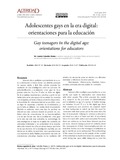Mostrar el registro sencillo del ítem
Adolescentes gays en la era digital: orientaciones para la educación
| dc.creator | Calvelhe, Lander | es_ES |
| dc.date.accessioned | 2019-07-01T09:27:41Z | |
| dc.date.available | 2019-07-01T09:27:41Z | |
| dc.date.issued | 2019 | |
| dc.identifier.issn | 1390-8642 | |
| dc.identifier.uri | https://hdl.handle.net/2454/33535 | |
| dc.description.abstract | Internet offers multiple opportunities to access quickly and easily to information and interactions with other people. This article presents the results of a research on the processes of self-identification and socialization as gay of a group of twelve teenagers between 14 and 19 y.o. in this digital age. Here their experiences and practices are analysed based on their testimonies in which we find the need for connection with their peers, and at the same time, the fear of homophobic bullying. In coherence, Internet is perceived as a place of hope and also of uncertainty, hence it is used with caution and anonymity. Moreover, there are evidences on how these Internet practices are more common during a period of confusion about the consequences of their homosexuality, and also on how their decline once the teenagers' socializations as gay in real life are more widespread. The methodology of this research is based on the analysis of the content of the individual in-depth interviews of a sample elaborated during two years, while taking into account the contributions of the narrative research and its interest on storytelling and the anecdote as approximations to lived experience. The article ends proposing educational implications based on the results of the study, and putting them in relation with other authors' materials and reflections. | en |
| dc.description.sponsorship | Investigación subvencionada por el Ministerio de Ciencia e Innovación en relación con el proyecto “Jóvenes productores de cultura visual: competencias y saberes artísticos en educación secundaria”, con referencia EDU2009-13712, concedido en el año 2010. | es_ES |
| dc.format.extent | 11 p. | |
| dc.format.mimetype | application/pdf | en |
| dc.language.iso | spa | en |
| dc.publisher | Universidad Politécnica Salesiana (Ecuador) | es_ES |
| dc.relation.ispartof | Alteridad: revista de educacion, vol. 14, nº 1 (2019), pp. 65-75 | es_ES |
| dc.rights | Creative Commons Attribution-NonCommercial-ShareAlike 4.0 International (CC BY-NC-SA 4.0) | en |
| dc.rights.uri | https://creativecommons.org/licenses/by-nc-sa/4.0/ | |
| dc.subject | Adolescencia | es_ES |
| dc.subject | Identidad | es_ES |
| dc.subject | Homosexuales | es_ES |
| dc.subject | Entrevista | es_ES |
| dc.subject | Internet | es_ES |
| dc.subject | Análisis de contenido | es_ES |
| dc.subject | Adolescence | en |
| dc.subject | Identity | en |
| dc.subject | Homosexuality | en |
| dc.subject | Interviews | en |
| dc.subject | Internet | en |
| dc.subject | Content analysis | en |
| dc.title | Adolescentes gays en la era digital: orientaciones para la educación | es_ES |
| dc.title.alternative | Gay teenagers in the digital age: orientations for educators | en |
| dc.type | info:eu-repo/semantics/article | en |
| dc.type | Artículo / Artikulua | es |
| dc.contributor.department | Ciencias Humanas y de la Educación | es_ES |
| dc.contributor.department | Giza eta Hezkuntza Zientziak | eu |
| dc.rights.accessRights | info:eu-repo/semantics/openAccess | en |
| dc.rights.accessRights | Acceso abierto / Sarbide irekia | es |
| dc.identifier.doi | 10.17163/alt.v14n1.2019.05 | |
| dc.relation.publisherversion | https://doi.org/10.17163/alt.v14n1.2019.05 | |
| dc.type.version | info:eu-repo/semantics/publishedVersion | en |
| dc.type.version | Versión publicada / Argitaratu den bertsioa | es |



